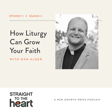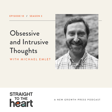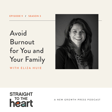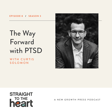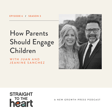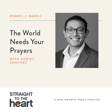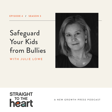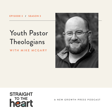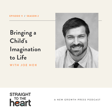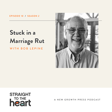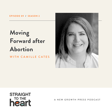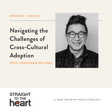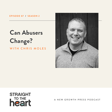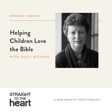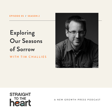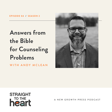Introduction to 'Straight to the Heart'
00:00:00
Speaker
going through the Psalms and looking at how these people cry out to God, how they're uncut, they are uncensored in the Psalms with God. And we often feel that we gotta tidy ourselves up, which literally goes against the gospel. Like we come dirty, jacked up because we can't fix ourselves.
00:00:20
Speaker
I'm Rush Witt, and you're listening to season two of Straight to the Heart, a podcast from New Growth Press.
In-depth Discussions with Christian Thinkers
00:00:27
Speaker
Each episode includes thought-provoking conversations with leading Christian writers and thinkers. We hear who they are, what they believe, and how they approach their work in ministry, and the moments in people who have changed their lives. In Straight to the Heart, we go beyond the books to connect with the remarkable people behind them.
00:00:47
Speaker
We're happy to be in our second season, so thank you for listening to, subscribing, and sharing Straight to the Heart with others.
Interview with Jerome Gay Jr. on Ministry Challenges
00:00:56
Speaker
In this episode, I talk with pastor and author Jerome Gay Jr. about the challenge of ministry in our current culture.
00:01:03
Speaker
the important art of being winsome in conversation, and how pastors and Christians can productively engage others in discussion about difficult social topics. Jerome is also founder of The Urban Perspective. Thanks for joining us for season two. This is Straight to the Heart. So you're a busy guy.
Balancing Family and Ministry Responsibilities
00:01:28
Speaker
Yeah, a lot going on, man. A lot going on. But God is faithful and He's keeping me.
00:01:33
Speaker
That's good. Well, tell me about these great things that you've got going on. You know, you're pastoring, you are writing books, you are leading an organization, the urban perspective. And just tell me more about how all that's working together for you.
00:01:49
Speaker
You know, yeah, so just my family is the the most important thing, right? Like, you know, always tell guys I train the most important churches, the one at your home address. And so for for us, you know, my daughter started college. So she's a freshman at East Carolina University. My boys in middle school, we celebrated 22 years of marriage in July.
00:02:12
Speaker
So I think that the thing that's kept me grounded in doing all those things is scheduling around family time and making sure that the family time isn't forfeited by the books and the preaching and speaking and all those things. So I think that's been huge in keeping me grounded and really my wife and I being on the same page of speaking engagements, being able to write books, being able to even do podcasts like this.
00:02:41
Speaker
So I think for me is just going back to that 1 Timothy 3, which talks about the qualifications of a pastor, one of the primary ones being your family, letting that be a source that keeps me rooted in ground, which means sometimes I have to say no to things, not every opportunity.
00:02:58
Speaker
is a God-given one, even though it may be good. You know, I want to really look at just the health, the connection, the closeness, the discipleship within my family. And so that focus of just making sure that familial health is in place bleeds into these other things that I have going on with the books, my online YouTube channel, The Urban Perspective, which is more apologetic in nature, trying to equip the body of Christ.
00:03:26
Speaker
apologetics and then, you know, writing books from one on the book of Ruth to the Christian history, the White Washington Christianity to my latest one, African Heroes, my first children's book. So all those things, again, kind of because even that book is based on my family. Right. So just coming back to that Christ centered gospel foundation and how that springs forward into into the family, man.
00:03:51
Speaker
Well, you have a great perspective on that and the use of time, which I think is really important. I really admire people that can do a lot with their time, but keep things in balance. And I know that's really hard. At the same time, there's a ton of time in a week. There's really a lot of time if we count it up.
00:04:10
Speaker
and prioritize it and it's an encouragement to me to hear you talk about your family and ministry and how you're keeping all of that straight. Tell me more about the urban perspective because I don't know about this.
Purpose and Impact of 'The Urban Perspective'
00:04:26
Speaker
Yeah, so that's a YouTube channel I started several years ago, really because one of the things I used to wrestle with prior to becoming a Christian was that the Christians I encountered didn't answer questions. They would usually have a Christian cliche or they would just say, don't question God. They used to always wrestle with us like, well, you just told me he knows everything. He's omniscient. So why shouldn't I question the one who literally knows everything according to what you're saying about him?
00:04:55
Speaker
And so that just never made sense to me that you're telling me not to question the person who knows everything as I'm wrestling with, should I trust him or not with my soul? And so as I became a Christian, when I became a Christian, I wanted to be one, not who knows everything, because people aren't saved by knowledge, right? However, we should give a reason for the hope that lies within us, 1 Peter 3, 15.
00:05:18
Speaker
And so I wanted to create a YouTube channel that would dig into some of these objections to Christianity, things that people may be wrestling with concerning Christianity, misconceptions about Christian history. So many people keep saying, Christianity was created at the council, and I say like, no, no, it wasn't. You know, like this, that's not historically, you know, even though I know this may not convert you, but that's historically inaccurate.
Faith, Reason, and Critical Thinking
00:05:42
Speaker
And so wanting Christians to be,
00:05:44
Speaker
equipped in knowing what they believe and why we believe it. Because we should not be followers with blind faith. Peter, I'm sorry, writes, faith and reason can coexist. And because faith and reason can coexist, Christians should be critical thinkers. We should critically look at our texts. We should ask questions of the text.
00:06:05
Speaker
And these things won't lead us to deconstruction. They will lead us to a more firmness of our faith. And so that's the heart of that. You know, youtube.com slash the urban perspective is where people can see some of the content. A lot of discussions interviewing people or some of them just me solo addressing a particular topic.
00:06:24
Speaker
You know, it seems to me that, you know, because of the fall, there have always been race issues. But the most recent season in our society seems in certain ways to have brought a lot of that to the forefront or to the minds and hearts of people. And so I wonder, even in the last few years, as these things have happened, what has been your perspective
00:06:49
Speaker
or your point of view on the developments, the challenges, and what have you seen as being the most important aspects of this issue to try to wrangle with so that we can keep the gospel central and bring it to bear upon these really serious, personal, grievous issues in our society?
Addressing Historical Mistakes and Racial Issues
00:07:15
Speaker
Yeah, I think first is we need to admit
00:07:18
Speaker
some of the hermeneutical areas that have been made in antiquity by people who call themselves Christians. But we have to be able to admit that, that Whitfield, we call him great for his homiletics, but he owned slaves. And we can't make excuses for things like that. He did not leave anything in his will to his slaves when people try to
00:07:39
Speaker
try to rosy it up, you know what I mean? You know, when we look at Jonathan Edwards, we have to look at these things and say, hey, there are people that we've called heroes who may have had good orthodoxy, but they didn't quite have good orthopraxy in terms of how they treated people who did not look like them. And then going and taking that to the scriptures where
00:07:58
Speaker
First John, the Apostle John writes, hey, you cannot say you love God who you can't see if you don't love your neighbor who you can see in First John 4. So having that biblical foundation. But then while we're pressing into that, acknowledging the ills of history and making sure that scripture is our foundation, we also need to come back and say that race is a feature of who we are, but it was never intended to be the foundation. So race is a feature, not our foundation. Christ is our foundation. That doesn't mean I'm ashamed to be a black man or I won't use that label.
00:08:28
Speaker
but I know who the source of my identity is. And so it's important that we address these things, but then come back and make sure we combat those things in the past that need to be combated or these ideals in the present that need to be combated. But we also need to be compellingly compassionate about the concerns of those who are saying like, I'm seeing this mistreatment.
00:08:48
Speaker
I'm experiencing this and make sure we're not just automatically dismissing them as liberal lefters without even knowing them, without knowing their story, without actually hearing their position. It's important that we actually show that grace and compassion. He was full of grace and truth, and we need to make sure that we exhibit that as well in conversations like this.
00:09:09
Speaker
It seems like as we talk about your life in ministry and the things that God is doing and the ways that He's using you, that you're really focused on leadership development, teaching as a pastor, as an author, collaboration with other people to
00:09:27
Speaker
for ministry and for the good of the gospel. And really, I think, as I think about that list, that there's a common thread there of really about communication. A lot of what we've been talking about so far is how we communicate with other people, and in particular with those who have differing viewpoints. And you've used the word winsome, which is a word that I really like. Actually, probably the most prominent influence in my life
00:09:53
Speaker
With respect to that word in particular is probably David Palleson, biblical counseling leader and a huge, huge influence in the biblical counseling movement. And so I'm curious just to talk a little more with you about that word, winsome. As you think about communication, teaching, developing leaders, what is it about being winsome that is valuable to you?
Engagement with Truth, Grace, and Controversial Topics
00:10:17
Speaker
And why is that, you know, one of those key, you know, high dollar words for you?
00:10:23
Speaker
Yeah, I think when I hear that word, you know, like everything, there's nuance with it. Some hear winsome and they hear compromise. I hear winsome and I think engagement with truth. So for us, we wanted to engage, like literally now we're walking through Jude, the Book of Jude.
00:10:44
Speaker
It's a lot of stuff in those 25 verses, you know, one being Sodom and Gomorrah, right? So I have to address sexuality. And I believe in what the Bible says, a biblical sexual ethic of marriage being between a man and a woman. I believe what scripture says.
00:11:01
Speaker
I don't back down from that. But I also believe that we shouldn't be using derogatory terms. So winsome is this idea of holding the truth, but still letting them know that grace is available. That's the beauty of 1 Corinthians 6, where he's saying some idolaters, homosexuals, and such were some of you. Well, for that to be in that past, that means that they had to be engaged.
00:11:24
Speaker
that they were one to Christ by God drawing them to himself, most likely through a human agent. And so we want to be those human agents that God uses to draw people to himself to depopulate hell for his glory. And the only way we can do that is being led by the Spirit, but we don't need to offend for the wrong reasons. I do agree that the gospel is offensive because not everyone
00:11:48
Speaker
believes it, but we want to make sure that the gospel is offending, not us being spiritual jerks and not showing love, not being winsome, not being loving. So let's hold the truth, like, so perfect time for you to ask me this, Russia's like, I'm literally having to go before people say, some of you are going to disagree with this, but we agree with what the scripture says, but I want to do it in a winsome and a loving way.
00:12:16
Speaker
Yeah, one of the principles that comes to mind as we have this conversation, which actually came into clear review for me personally and as a pastor through the recent struggles that all of us have faced because of major issues that have to be addressed, differences between people, has really been the difference between a kind of mission field mentality and a battlefield mentality.
Missions Over Debates: Navigating Differences
00:12:39
Speaker
Because as we led our church in particular through the last few pretty rough years, because there was obviously the pandemic, it was mixed with political issues, it was mixed with big social issues, that one of the things we really struggled to keep our hearts
00:12:57
Speaker
on was just the way that we were going to interact with other people. And what tends to happen, I think for me, and probably for a lot of Christians, is we tend to get into this debate mode. I'm just going to try to show you all the facts so that you'll come to my side. But rather than just going at the facts of the issue to try to win a debate about something, there is an opportunity because of the gospel to use that difference as
00:13:27
Speaker
and entry gate into the life and experience of that person. And I know that I need help with that and lots of people that I know are wrestling and need help. And so what have you seen in that way of personal interaction and, you know, mission over battle, um, ministry over debate in your own interactions with people,
00:13:52
Speaker
as a pastor or as a Christian in your community, have you seen that play out?
Recognizing Spiritual Warfare and Displaying the Gospel
00:13:58
Speaker
Yeah, I wanna always use scripture as my filter, right? So it says we wrestle not against flesh and blood, but against spiritual wickedness in high places. So I wanna know like my goal isn't to beat the person. My goal is to war in the spirit by being led by the spirit. And so he's gonna lead me into all truth.
00:14:21
Speaker
And so this person is not going to be won over by my intellect or my eloquence, or even if I prove them wrong. In that moment, I want to be a tangible display of the gospel. So my tone, my demeanor, and of course, my argument, so to speak, does matter. But I can get the expense of those other things.
00:14:46
Speaker
So sometimes there's a wrong way to be right. And I want to recognize that I can be guilty of that, that I can be guilty of saying the right thing the wrong way. And so because I'm aware of that, I want to pay attention to those things that I don't need to come across as arrogant or condescending or because I have a degree in this and they don't.
00:15:07
Speaker
not trying to make them look or feel stupid on my end. I can't control how they feel because we are in a culture now where it's like, unless you affirm me, you know, you could be called a bigot no matter what tone you use, you know, in today's culture. But I am still responsible for how I present it.
00:15:26
Speaker
And I want to present it, you know, in a loving way. And so that's that's why I'm looking at it where I want it is really both. It's a mission battlefield. But the battle isn't for us to win an argument. The battle is God is saving souls.
00:15:43
Speaker
And so that's what we need to, we need to be willing to adjust our tone or whatever. I mean, if Paul is willing to give up meat in 1 Corinthians 8, if Paul is willing to become all things to all men so that they may share in the gospel, that's the point, that they will share in the gospel, then we need to have that same posture, being willing to give up things for the sake of the engagement of the soul.
Promoting Christian Heritage Through Children's Literature
00:16:06
Speaker
At New Growth Press, we love to produce children's books which are beautiful, engaging, and biblical, and also helpful in teaching children important truths of our faith. African Heroes, Discovering Our Christian Heritage, shows children how God has used all races and ethnicities in his plan of redemption by celebrating and highlighting the contributions of African theologians and martyrs.
00:16:30
Speaker
Author Jerome Gay introduces children to the stories of 11 amazing African leaders, including Augustine, Athanasius, Tertullian, and more. African Heroes presents these figures on a level children can understand with diverse imagery and colorful illustrations. This book is written for children ages four to seven to show the African roots of the early church. Visit NewGrowthPress.com to learn more.
Overcoming Cancel Culture Fears and Racial Conversations
00:16:59
Speaker
As we think about, in particular, some of those big issues, like racial issues in our country or in the world, and other issues of justice, disagreement, the clash of worldviews, it seems like one of the things that may hold a lot of Christians back, especially in this charged moment,
00:17:21
Speaker
where we hear a lot about what's coined as cancel culture, it sort of surrounds the conversation or the ministry opportunity with this
00:17:33
Speaker
danger or the sense of danger and fear. And I think that probably holds a lot of us back from knowing how to get involved because if I feel like I don't know the right thing to say and I say the wrong thing, the stakes are really high because I'm watching the news. I'm interacting with people and I'm seeing the way mistakes
00:17:53
Speaker
are becoming costlier and costlier as we move on. So I wonder just from your experience, your wisdom, your writing, what can individuals who may feel that fear, what are some ways that individuals can be active in this in the most helpful ways?
00:18:13
Speaker
We have to be willing to get out of our echo chambers and we have to get out of the echo chamber and be willing to be a minority and to be misunderstood and mislabeled. And that's part of Paul's life, right? If you look at, he's a Jew called the Gentiles. So he's like, hey, you're gonna be my instrument to people who are completely culturally different from you, right? Culturally, socially, economically.
00:18:40
Speaker
And yeah, that's where I want you to go. And so when we when we assess our calling, we and we're trying to be a repair of the bridge, then we just have to live with the tension that some people will make untrue assumptions about us, but we're still willing to not leave the room or the conversation.
00:19:03
Speaker
And that's what takes a move of the Holy Spirit, man. Cause that's what I've seen is people leave. Like when they're not affirmed or they're not agreed with.
00:19:13
Speaker
or if they're mislabeled and they could legitimately like, yo, that's not you, you were called a racist wrongly. When you were literally trying to seek knowledge and they labeled your ignorance as racism, which is why in my book, my book, The White Washington Christianity, I intentionally did a subtitle because I know some people are gonna hear that and assume white bashing. That's the furthest thing from the truth. So the subtitle is a hidden past, a hurtful present, but a hopeful future.
00:19:42
Speaker
So I want to use that H alliteration to say, hey, I'm going somewhere, but we got to deal with this ugliness. And in that, I did a racial spectrum. And I said, there's racial ignorance, which is when we don't know, because some of our experiences may have been primarily homogenous.
00:19:57
Speaker
So there's racial ignorance. Then there's racial indifference. So racial ignorance is don't know racial indifference is don't care. It's like either either one can happen. Then there's a racial insensitivity. This is when you're entertaining things about other groups.
00:20:13
Speaker
that are, you know, that are harmful that you probably need to turn from, then there's racism. So we can go from racial ignorance, racial indifference, racial sensitivity, then racism. We now can kind of see where we are on that spectrum as opposed to immediately calling everything racist when that may not be the case.
00:20:32
Speaker
Yeah, for pastors also and other leaders, you know, church leaders or leading voices and those who have, you know, maybe particular or disproportionate influence in their churches, thinking about your church and other churches that have done well to engage these difficult topics, what do you see as maybe the top one or two moves that they have made to strengthen their congregation,
00:20:58
Speaker
in their preparation to bring the gospel into really challenging moments and to bring truth and win some ways.
Advice for Pastors on Cultural Engagement and Counseling
00:21:06
Speaker
What would you say are some of those pieces of advice you would give to pastors like you? I'm a pastor as well. So pastors like me, what would you say to me as a fellow pastor that I could be thinking about, praying about, focusing on in my church?
00:21:21
Speaker
Yeah, one of the things I had to do is just listen to people I disagree with. Not to affirm, especially if it's false doctrine, but at least to know because some of these YouTube people with millions of views or subscribers, my people are listening to some of these people. And so as much as their view may be
00:21:44
Speaker
It makes no sense to me, right? To someone is hitting them. So I need to, now of course we can't listen to everything, but the primary kind of patterns I'm seeing or things that I'm seeing my people like or reshare that are harmful, I need to be aware of those as a shepherd because I'm trying to, my job is to lead, feed, no care, protect as an elder, one of six at my church. So I wanna know those things.
00:22:14
Speaker
But then, you know, the other thing in that is also really encouraged my people to and I so I created a position. One of my passes is past of health and strategy.
00:22:28
Speaker
And so his entire job is, he's found organizations so that all of our team can get counseling, that we can have these things to process our own trauma, and then how can we make certain things available for the church? Because this is an aspect of a healthy church that we've ignored, is understanding that. There's a book called The Other Half of the Church, where there's this neurological theologian
00:22:56
Speaker
who dug into this, just the aspect of how God has created our brains that often gets ignored in discipleship and spiritual formation. And so knowing that, we want to look even into that. Like, part of this, part of the reason we can't get together is because you don't know how to handle conflict, because you have so much trauma that you have in process, and you're unwilling to get
00:23:19
Speaker
get counsel. So even though it doesn't seem like it's connected to the race conversation, it is because when disagreement comes up and the person is of a different race, you immediately castigate them as racist or harmful because you don't know how to be disagreed with because you never got counseling or how to handle conflict. So it's like when you learn like, oh, okay, it's a lot deeper than we're just looking at the response. We're not dealing with the root.
00:23:41
Speaker
And so really having a community of counseling, which I'm really proud of our church where we just had an event that was called Traumatic Residue where we brought in a counselor to talk so people can begin to learn. There are certain things that have impacted me and now they're affecting my friendships, my parenting, my marriage.
00:24:03
Speaker
They're impacting all of these things because I have not addressed it. And then lastly, doing series on it. I did a series called Safe Space. I did a series on these things really going through the Psalms and looking at how these people cry out to God, how they're uncut. They are uncensored in the Psalms.
00:24:24
Speaker
with God. And we often feel that we got to tidy ourselves up, which literally goes against the gospel. Like we come dirty, jacked up because we can't fix ourselves. And so wanting people to have that freedom. So having that position, a culture of counseling, and then listening to people you disagree with.
00:24:46
Speaker
We all know that conversations about race and ethnicity can be uncomfortable, so I want you to know about the mini-book Talking to Your Children About Race, a biblical framework for honest conversations by Jerome Gay, Jr.
00:25:01
Speaker
Often, parents don't know what to say or how to say it. It might seem easier to duck a hard, confusing subject, but your children are already learning about race from the world around them. Pastor Jerome Gay Jr. equips parents for conversations about race.
00:25:18
Speaker
helping you take an active role in ensuring that your children are given a biblically rooted and gospel saturated view of race and ethnicity. You can learn tips for discussing issues of injustice and biblical reconciliation, as well as proactively engaging and learning from others from different ethnic backgrounds. By not shying away from this topic, we can be equipping our own children as kingdom citizens who reflect Jesus to a polarized world.
00:25:47
Speaker
visit NewGrowthPress.com to learn more about talking to your children about race by Jerome Gay Jr. I appreciate really that, especially everything you're saying, but especially the part about listening to those that we disagree with, because as you said, it's so easy to be caught in this echo chamber where all you hear is your own voice or your own, you know,
00:26:13
Speaker
group speaking back to you the things that you already believe in so i really appreciate that a lot of our listeners obviously are readers and so i have a question that i think is helpful and interesting for you and it's it may be a little bit of a longer one but.
00:26:29
Speaker
In terms of books that you have found helpful, I wonder around these difficult topics, what are two books that come to mind that you were really helped by because they agreed with you and they helped develop your biblical viewpoint?
00:26:48
Speaker
And what are two books that were written by people that disagreed with you that were most helpful to you to glean from them the other side so that you could understand how do these conversations need to be crafted to be most productive and helpful and understanding and charitable?
00:27:08
Speaker
So specifically, when we're talking about more like race, culture, and history, so two books that I agree with. The first one would be Urban Apologetics, where I contributed to the book, but Dr. Eric Mason was the general editor because it's dealing with these different topics. And so there are several volumes of that. So I would say each of those volumes, people should get those because it's it's it's equipping us on how to engage these. The second book would be
00:27:33
Speaker
A Burning House by Brandon Washington, where he's talking about evangelicalism and digging into the history of how we got to this point. And so those are two books I would definitely suggest. So Urban Apologetics, Dr. Eric Mason, A Burning House by Brandon Washington.
00:27:53
Speaker
Books where I may probably disagree with a lot of their assessments, but it's still equipping. One is called Woke Racism by John McCarter. He was a columnist, but he's more of a conservative African-American. He's digging into these things. Again, there's pieces I agree with and I disagree with.
00:28:12
Speaker
Blackout by Candace Owens, who's definitely a hot button topic. So yeah, rereading her where I said like, hey, there are some aspects I do agree with, but there's a lot I disagree with in terms of her approach and even some of her conclusions.
00:28:30
Speaker
how they view certain aspects of history that I may see as incomplete. So those are two, if I'm restricted to two and two, I would say those. I've asked you a lot of hard questions, difficult, heavy questions. So here's a softball as maybe a last question today, which I think will be interesting to hear what you say. If you inherited, let's say $10 million tomorrow,
00:28:57
Speaker
What are you going to do with it? And it does not have to be spiritual, church-related. It's an honest question. What would you do with $10 million tomorrow? Yeah. So, well, this is literally just what I would do. All right. Let me first set aside some for God's mission. That's just how we operate. Let's pay off our house. No debt.
00:29:23
Speaker
let's have more, because I want to think about, even though I wouldn't be here in this scenario, but I think about my impact for my family when I'm gone. So what am I leaving? Then I can get to my personal stuff, you know, handle kind of God's kingdom, our, you know, no debt for us, our kids. And then thinking through, you know, if I could have put more into
00:29:52
Speaker
creating nice online content. I would build up a nice state of the art studio for that for the YouTube channel. And then empowering other solid Orthodox Christian YouTubers and stuff because people aren't reading.
00:30:10
Speaker
I mean, that's just the truth. You know, we're going to keep writing, but generally speaking, people want those video sound bites. So we need to have good content out there that's going to combat a lot of the false stuff that's getting millions of views because the truth is the lie gets more clicks.
00:30:27
Speaker
than the truth. But we still need to keep putting truth out there. So those are some of the things I would do, obviously vacations and stuff. So yeah, I mean, I'm, I want to have fun with it. I'm gonna be honest, I'm gonna be real with you. I'm gonna have some fun. We got some trips and stuff. But just being 44 and having a family, like just my first thought is let's make sure these things are taken care of. Now let's have some fun with the rest.
00:30:53
Speaker
That's smart. I don't think either of us have to worry about this problem, but it's fun to talk about. I like your ideas. They're similar to mine. Well, I've really enjoyed Jerome spending this time with you today. Yeah, same here. I appreciate it.
00:31:11
Speaker
I enjoy learning from people who have thought about key important topics more than I have, and it just helps me and it helps the people who are listening. Thanks for having me, man. I really appreciate it. Thanks for having me, man. You've been listening to Straight to the Heart, a podcast from New Growth Press. Our next episode releases next week, and I look forward to seeing you there.

